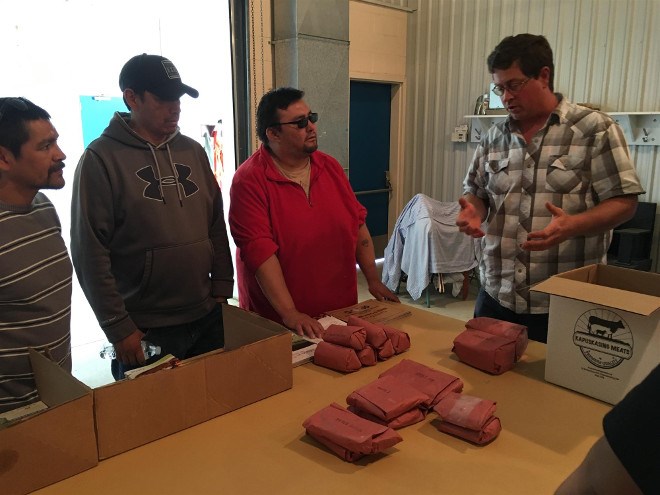Collège Boréal and the Beef Farmers of Ontario (BFO) used a little prodding to sway members of Kashechewan First Nation to consider a future in agriculture.
Seven members from the fly-in James Bay community got their first taste of beef farming this summer through an introductory program offering by the francophone college in Kapuskasing.
Beginning in early July, the curriculum in the eight-week “Introduction to Beef Cattle Farming” program was designed to cover all aspects of beef production for beginners.
Michelle Lebel, director of Boréal’s Kapuskasing campus, said the idea of the short program was to gauge whether there was any interest from the community in pursuing careers in agriculture.
In recent years, Kapuskasing has become a spring refuge for flood evacuees from the community on the Albany River, 320 kilometres north of town.
“Since we had Kashechewan First Nation evacuees in town for the last three or four years, we thought maybe it would be a good fit to see if some were interested in farming,” said Lebel.
The 13-module program provided classroom and hands-on practical training in covering farm health and safety training, herd health and management, genetic improvement, crop production, pasture, and feedlot management, farm equipment maintenance and business planning.
“The participants are really enjoying the course,” said Lebel in an early August interview.
The proof was in the volume of photos and short videos the participants posted daily on social media showing the new skills they were learning.
The instruction took place at the municipally-owned Kapuskasing Demonstration Farm.
The expansive 900-acre facility is rented out to Andrew Gordanier, who raises cattle, sheep, chickens, and pigs. It allowed the group to experience a wide variety of agricultural practices in one place.
Retirees of the former federal research farm also helped with instruction.
The Beef Farmers of Ontario have identified Northern Ontario and the Kapuskasing-Highway 11 corridor as being ideal for the expansion of the province’s cow-calf herd.
The abundance of affordable land, the soil conditions, and climate are suitable for pasture raised livestock.
It might not be in the cards to envision flood-prone Kashechewan as being the perfect breeding ground for beef production. But Lebel said the program’s intent is to open a door and leave a lasting impression with the participants of agriculture as a way of life.
“We do realize it would be hard to have beef cattle in Kashechewan, but I think the program introduces them to different areas of agriculture. We’re not saying it can’t be done, it’s just that it hasn’t been done yet.”
Lebel knew the course material was resonating with the group when they brought back a Kashechewan soil sample after a weekend back home. They wanted to know if the ground is suitable for farming.
“When they came back with that soil sample it really made me proud to see that what they had learned. They really wanted to see where this was going. They seemed to really enjoy it and they want to learn.”
Tours were provided to cattle farm operations in the Hearst-Cochrane, along with presentations from BFO representatives.
“We’ve tried to make it as interactive as possible,” said Lebel.
With farming in the North on the rebound, Boréal saw an opportunity to recently launch a two-year agricultural techniques program, which is run out of their main Sudbury campus.
Lebel said this short introductory program is no different than the variable and customized contract training they provide to employers or to address industry needs.
“We can move it from beef cattle to another type of animal. We can expand (the program) to make it longer or BFO has shown interest in a condensed weekend for someone who already had an agriculture background.”
Whether this exposure to farming practices leads to more participation by First Nation communities remains to be seen, but the interest is definitely there and she would love to roll it out to more Indigenous and non-Indigenous communities across Ontario if requested.
Lebel said two participants from the Kashechewan group are permanently relocated to Kapuskasing. She wasn’t aware of their future plans.
“Last September, we did a weekend course with the University of Guelph and we were very surprised at how many participants actually signed up for this course to learn more agriculture. I think the movement is starting again, people are interested, but I think we’re in the first phase. It’s going to take a bit of time, but I do believe the sector is growing. I’ve had high school students asking about the program (who are) interested in going into agriculture.”




